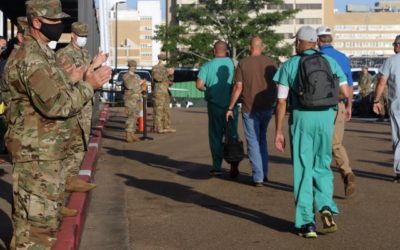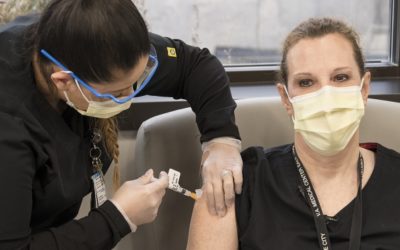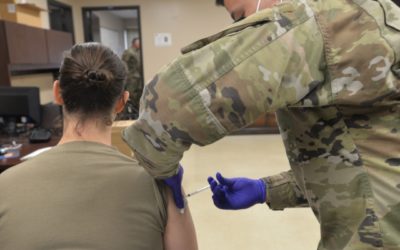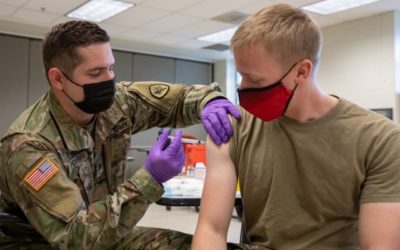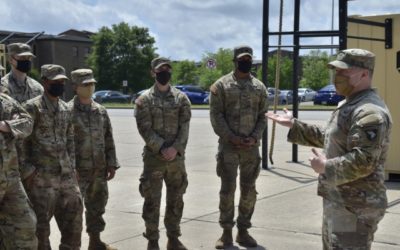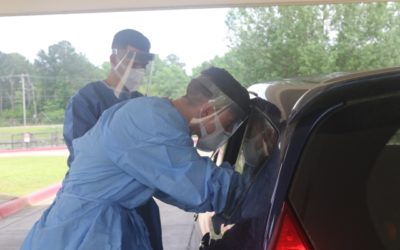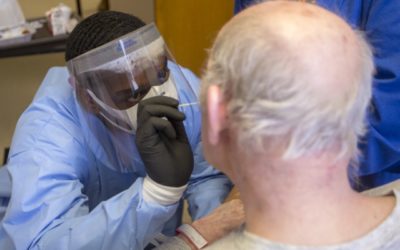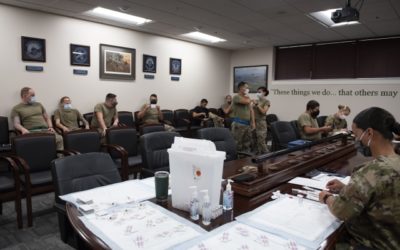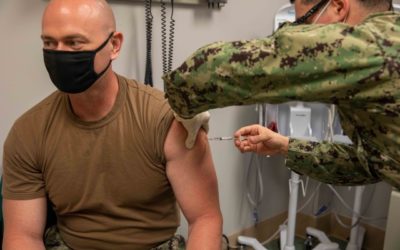When the COVID-19 vaccines rolled out last winter, a unique partnership between the VHA and other federal agencies provided the first real-world evidence—outside of clinical trials—of how well the vaccines were working.
Death Rate Increases for VA Patients Lagged Community Levels Last Year
Despite older age and more potentially dangerous comorbidities, veterans receiving VA care fared better last year than those treated in community healthcare systems during the COVID-19 pandemic, according to a new study.
Nearly All VA Employees Comply with Federal COVID-19 Vaccine Requirements
Nearly all, 98%, of VA employees facing a COVID-19 vaccination requirement have had at least one dose of vaccine or have requested an exception or extension, according to White House data released just before Thanksgiving.
As Deadlines Neared, DoD Moves Toward Fully Vaccinating Active-Duty Troops
The DoD is moving steadily toward its goal of vaccinating all military personnel. By early November, 97% of the DoD’s active-duty force had received at least one dose of COVID-19 vaccine.
Only About Half of ASCVD Patients Get Influenza Vaccines
Only about half of U.S. patients with atherosclerotic cardiovascular disease receive annual influenza vaccine, and the rate is lower among Black and Hispanic patients than white ones.
VA Study Establishes Link Between Flu Infection, Acute Myocardial Infarction
Previous studies have established an association between laboratory-confirmed influenza infection (LCI) and hospitalization for acute myocardial infarction (AMI).
Kidney Injury Gauged in VA Influenza, COVID-19 Patients
COVID-19 is often compared to other respiratory viral illnesses, but few of those comparisons contrast the virus’ varying effect on kidney health and function.
Disparities Fueled Outbreaks of COVID-19 Among Native Americans
From the start of the pandemic, American Indians and Alaskan Natives have been disproportionately impacted by the virus. New data released last month by Johns Hopkins University (JHU) helps visualize that disparity, which has been blamed on a higher rate of preexisting conditions and poorer health infrastructure.
Native Americans Have the Highest U.S. COVID-19 Vaccination Rates
Native Americans, a category including American Indians and Alaska natives, have consistently had the best COVID-19 vaccination rates in the United States since the shots became available in early 2021, according to the national Centers for Disease Control and Prevention.
mAb Therapies Effective Against Severe COVID-19 in Native American Cohort
Monoclonal antibody (mAb) therapies were highly effective against COVID-19 in a recent study of Native Americans — a group that has been underrepresented in clinical trials for COVID-19 therapies despite being at greater risk for severe disease.
Patients With Uncontrolled HIV Face Higher Risk of Sudden Cardiac Death
A new veterans study underscored the critical need for viral suppression and heart disease risk factor modification among HIV patients. Researchers determined that those with sustained viremia or low CD4 cell counts had an excess risk of sudden death.
OIG: Lack of Planning Made Illinois CLC COVID-19 Outbreak Worse
From almost the very start of the pandemic, nursing homes and long-termcare facilities proved to be particularly vulnerable to the virus. The close quarters combined with elderly patients suffering from preexisting illnesses resulted in a number of outbreaks and a much higher death rate than the general population.
Immunologic Resistance Used to Predict COVID-19 Outcomes in Veterans
Is it possible to predict which COVID-19 patients will advance to severe disease? A new study involving VA researchers suggested that the answer is “yes,” using the concept of immunologic resilience.
Military Sets Deadlines for Receipt of Mandatory COVID-19 Vaccine
By mid-December, all U.S. active-duty servicemembers will either be vaccinated against COVID-19 or have received an approved exemption from their service branch.
Patients With Uncontrolled HIV Face Higher Risk of Sudden Cardiac Death
A new veterans study underscored the critical need for viral suppression and heart disease risk factor modification among HIV patients. Researchers determined that those with sustained viremia or low CD4 cell counts had an excess risk of sudden death.
Racial and Ethnic Disparities Identified in Rates of Severe Influenza
Marked racial and ethnic disparities in COVID-19-associated morbidity and mortality have raised important questions about racial and ethnic differences associated with other respiratory viral infections, including influenza.
Navy Study Suggests Post COVID-19 Symptoms Can Affect Military Readiness
At 0.2% percent, the military’s current COVID-19 mortality rate is far lower than that of the general American public, which is just under 2%. But often those who contract and survive COVID-19 have to live with its long-term effects, regardless of the severity of their acute illness.
Veterans Study Finds That Kidney Disease Is Common ‘Long COVID’ Outcome
Patients who recover from COVID-19 often suffer long-term consequences. One of the most dangerous, according to a new veterans’ study, is the detrimental effects on kidney function, which might affect hundreds of thousands of survivors.
COVID-19 Shots Protected VA Cirrhosis Patients
Administration of mRNA COVID-19 vaccines to veterans with cirrhosis resulted in a delayed and modest reduction in infection rates. Excellent protection against related hospitalization or death was achieved, however, according to a new study.
No Link Between AMI, Two-Dose HBV Vaccine
The overall prevalence of chronic hepatitis B infection in the United States is estimated to be around 1.59 million That’s one of the reasons the DoD, which has required hepatitis B vaccination for new recruits for nearly 20 years, added the mandate for existing servicemembers to receive the vaccine in 2014.
Unexpected Benefit for Minority Veterans: Easier Access to COVID Testing
The COVID-19 pandemic laid bare the impact of disparities in access to healthcare and ongoing differences in the seriousness accorded to minority patients’ health concerns. It also revealed significant benefits of receiving care through the VA.
Nasopharyngeal Swabs Superior for Diagnosing SARS-COV-2 Infection
Identifying SARS-CoV-2 infections quickly and accurately is critical to managing the COVID-19 pandemic and reducing community spread of the virus.
Military, VA, Other Federal Medicine Agencies Mandate COVID-19 Vaccines
The Food and Drug Administration’s full approval of the Pfizer-BioNTech COVID-19 vaccine paved the way for a sweeping vaccine mandate for military personnel.
Strebel Helps Create Tool to Identify VA COVID-19 Patients Most at Risk
Is it possible to create an algorithm that not only accurately predicts which COVID-19 patients will be hardest hit by the virus but will also be accepted and trusted by clinicians?
VA Model Promoted to Prevent COVID-19 Deaths During Vaccine Rollout
A model developed by VA researchers showed promise for preventing a substantial number of SARS-CoV-2-related deaths during vaccine rollout, if used in the general population, according to a new study.
VA Studies Seek to Find Balance in Antibiotic Duration for Male UTI Treatment
Urinary tract infection is one of the diagnoses for which antibiotics are most commonly used. So, a study determining that shorter duration treatment works as well as a longer course of antibiotics can have an outsized effect on reducing overuse of antimicrobials.
Veteran Homelessness Likely to Increase With End of Eviction Moratorium
While the last decade has seen a dramatic decrease in the number of veterans who are homeless on any given night, that trend has stalled in the last two years with numbers, even prior to the COVID-19 pandemic, starting to move upward again.
Defense Health Agency’s COVID-19 Vaccine Research Sparks Controversy
Research on rare adverse effects from COVID-19 vaccines has thrust the military into the center of the rancorous controversy about vaccination safety, causing some Congress members to question whether immunization against novel coronavirus should be required by the nation’s uniformed services.
WRAIR Tests Vaccine for COVID-19—and Future Pathogens
At Walter Reed Army Institute of Research, flexibility has been the watchword of the last 18 months. The team at WRAIR pivoted quickly from other work to focus on developing a vaccine for SARS-CoV-2 as soon as the scientific community had access to the full genome in January 2020.
Veterans Study Provides More Information on COVID-19 Vaccine Breakthroughs
More than 144 million people in the United States had been fully vaccinated against COVID-19 by mid-June, according to the national Centers for Disease Control and Prevention.

